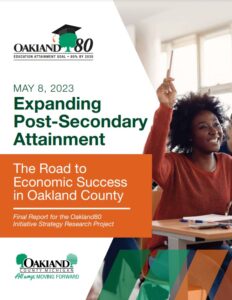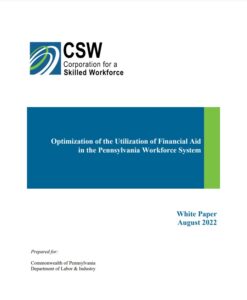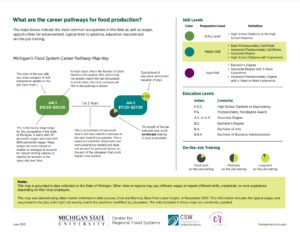CSW’s Research & Evaluation team provides workforce development leaders, practitioners, educators, and other community partners with access to data and findings on outcomes and best practices essential to help them make better decisions about how to serve customers, invest limited resources, expand on their strengths, and identify and reduce existing disparities. While research and evaluation are embedded within all CSW strategies, providing clients with quality labor market information (LMI) data and reports as well as other evaluation and research services is also a core strategy. We are passionate about data collection, analysis, and reporting that is culturally responsive, embeds a racial equity and inclusion lens, is ethical, grounded in current practice, and conducted by staff with workforce development, education, and social service experience.
Who We Work With
We work with organizations interested in evaluating their workforce and postsecondary programs or conducting research to support their programs and initiatives in advancing worker and learner outcomes and success. Clients and partners in this work usually include workforce development providers and intermediaries, states and local regions, and community colleges and other educational institutions.
How We Do It
- Workforce & Postsecondary Program Evaluation
- Labor Market Information (LMI) Data Collection & Reporting
- Career Pathways Mapping
- Data & Community-Informed Strategy Development
- Labor Market Information (LMI) Capacity Building
- Research & Evaluation Capacity Building
How We’re Making Change
Workforce & Post-Secondary Program Evaluation
CSW has extensive experience conducting evaluations of complex multi‐partner workforce and postsecondary initiatives. We are committed to serving as good partners, co-designing the evaluation to ensure useful findings, and providing thoughtful reflections about progress and outcomes throughout implementation. Our broad workforce development context enables us to provide relevant insights, high-quality products, and ongoing continuous improvement support.
Labor Market Information (LMI) Data Collection & Reporting
CSW assists organizations in collecting and reporting LMI to answer key questions about their local workforce development system to support data-driven decision making and resource investment. Data collected support partners in understanding who the workers and learners are in their region, what opportunities exist, if those opportunities are equitable and family-sustaining, and what training and supports are needed for access.
Data & Community-Informed Strategy Development
CSW helps clients research tailored, population-specific strategies, driven and informed by data and community, that help boost regional postsecondary and workforce outcomes. CSW is experienced in working with clients to meaningfully engage community members and partners in development to ensure that strategies are appropriate and have regional support. Using this approach, CSW has helped clients address labor force shortages and gaps in postsecondary attainment.
Career Pathway Mapping
CSW develops partner and learner–validated career pathway maps that reflect regional demand. We are experienced in tailoring pathway maps to meet our clients’ needs, including designing maps that only highlight career opportunities that pay living wages or are intended for priority populations.
Labor Market Information (LMI) Capacity Building
CSW provides organizations with not only access to LMI but also with the tools, support, and technical assistance to collect these critical data on their own and use their findings most effectively. Two examples of this support include CSW’s JPMorgan Chase-funded resource, Understanding Your Community: Labor Market and Workforce Development System Data Toolkit, and the Ralph C. Wilson Jr. Foundation and Ballmer Group-funded Partnering Economic and Employment Research (PEER) Academy.
Evaluation & Research Capacity Building
CSW also works with partners and clients to support their own research and internal evaluation capacity growth and development. We work with clients to facilitate a process for their logic model or theory of change development in their workforce programming design or expansion or to co-create a learning agenda or evaluation plan that they will use internally or with other evaluators. CSW also helps improve research practices in the field by developing resources like An Introduction to Trauma-Informed Research.
11.4 million Americans in the labor force aged 16+ were living below the poverty level in 2023.
Featured Case Study: Oakland80
The Oakland80 report, “Expanding Post-Secondary Attainment: The Road to Economic Success in Oakland County,” was released on May 8, 2023. The Oakland80 initiative was designed to increase post-secondary educational attainment to 80% in Oakland County by 2030, and the strategies and research in the report will support their work through 2030. This report was authored by Corporation for a Skilled Workforce (CSW), with close partnership from the Oakland80 team and the project’s five guiding committees.
In 2019, Michigan Governor Gretchen Whitmer set a goal to increase Michigan’s adult post-secondary education rate to 60% by 2030. Yet, in Oakland County, 61% of adults already had a college degree or other post-secondary credential in 2019, leading Oakland County and key partners to set a bold goal of 80% adult post-secondary attainment by 2030. To achieve 80% attainment and ensure attainment reflects progress for all Oakland County residents, County Executive David Coulter launched the Oakland80 initiative. Educational attainment after high school can be a key factor in economic opportunity and social mobility as it influences employment status, job quality, and access to jobs protected from automation. This includes both degree programs and short-term credentials. CSW found that while the county overall has high post-secondary attainment, progress has not been consistent for all residents. There were noticeable differences in residents’ educational attainment along racial and ethnic lines as well as where residents reside within the County.
Oakland County partnered with CSW to understand key data on the makeup, needs, and potential barriers facing adult residents without post-secondary education as well as to develop comprehensive, data-informed strategies the Oakland80 partners and stakeholders could pursue to reach their goal. To support the development of a mix of strategies that would address identified disparities through customized solutions for the County, CSW undertook a national scan of best practices. And, through a stakeholder validation process, five strategies were prioritized that Oakland80 can deploy with partners and stakeholders to support equitable post-secondary attainment:
- Accelerate secondary students’ exposure to career exploration
- Support transitions from high school to post-secondary education
- Optimize financial aid utilization for traditional aged students and adults
- Attract and retain students and talent
- Close equity gaps that exist in education and employment
While the research included in this report is tailored to Oakland County residents and their needs, CSW believes that the data and best practice information documented will be beneficial to any region interested in understanding the data they can collect to answer similar questions as well as to understand potential national best practices to leverage.
Recent Clients & Selected Work
- Industry Sector Partnership EvaluationGreater New Orleans Foundation
- Partnering Economic & Employment Research (PEER) AcademyRalph C. Wilson, Jr. Foundation and Ballmer Group; Partnering with the New York Association of Training and Employment Professionals (NYATEP)
- Evaluation of the Build Better Careers Initiative Sites 1 and 2 (Charlotte, NC and Memphis, TN) Truist Foundation and Strada Education Foundation; Partnering with CAEL (Council for Adult and Experiential Learning)
- Detroit Early Childhood Education Career Pathways MappingHope Starts Here
- Flint Smarter Manufacturing Educational Pathways MappingLIFT (operated by the American Lightweight Materials Manufacturing Innovation Institute)
- Michigan Agriculture and Food Systems Workforce Advancement Initiative United States Department of Agriculture (USDA)
- Michigan Labor Force Study Business Leaders of Michigan
- Oakland80 Strategy Research DevelopmentOakland80
- Optimization of the Utilization of Financial Aid in the Pennsylvania Workforce System Pennsylvania Department of Labor and Industry, Bureau of Workforce Development Administration
- Community Needs and Opportunities AssessmentGoodwill Industries of Southern Piedmont
- Tulalip Tribes & Everett Community College IT Program EvaluationU.S. Department of Education’s Native American Career and Technical Education Program (NACTEP)
- USDA SNAP E&T Partnership Grant EvaluationLocal Initiatives Support Corporation (LISC)
Featured Reports & Publications
Oakland80 Expanding Post-Secondary Attainment
CSW & Oakland80
Optimization of the Utilization of Student Financial Aid in the Pennsylvania Workforce System
CSW & Pennsylvania Department of Labor & Industry
Understanding Your Community: Labor Market and Workforce Development System Data Toolkit
CSW & JPMorgan Chase & Co.
Recent Posts on Research & Evaluation
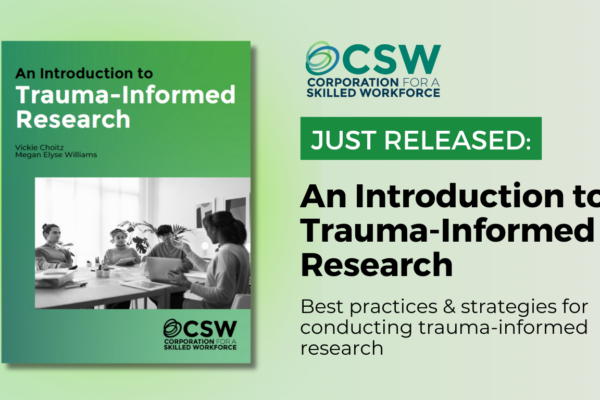
Just Released: An Introduction to Trauma-Informed Research PDF
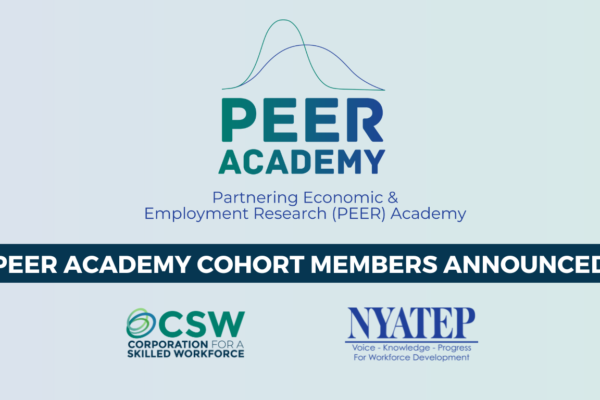
PEER Academy Cohort Participants Announced
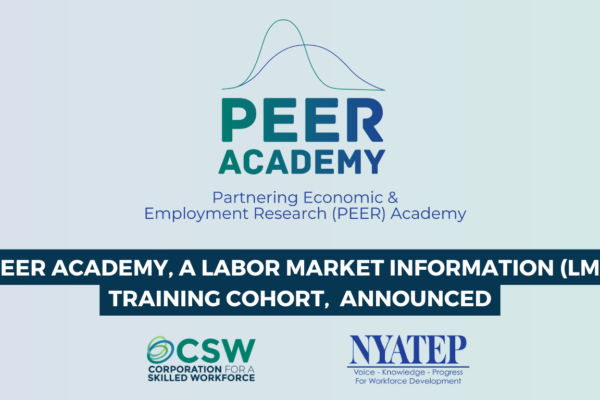
PEER Academy, a Labor Market Information (LMI) Training Cohort, Announced
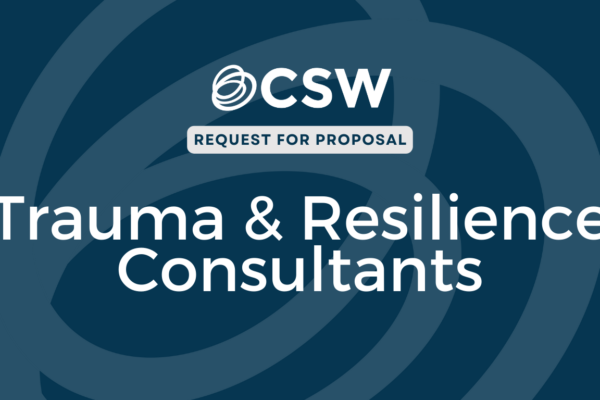
Request for Proposals: Trauma & Resilience Consultants
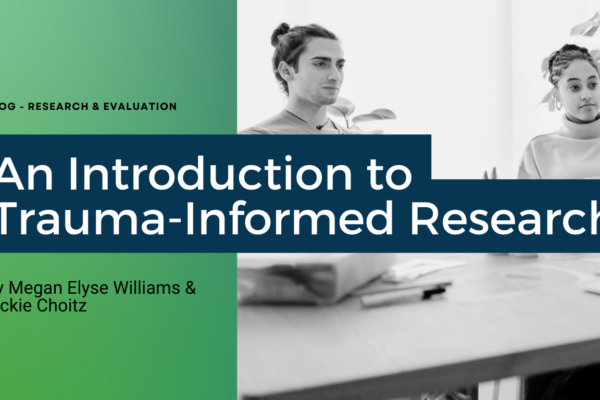
An Introduction to Trauma-Informed Research
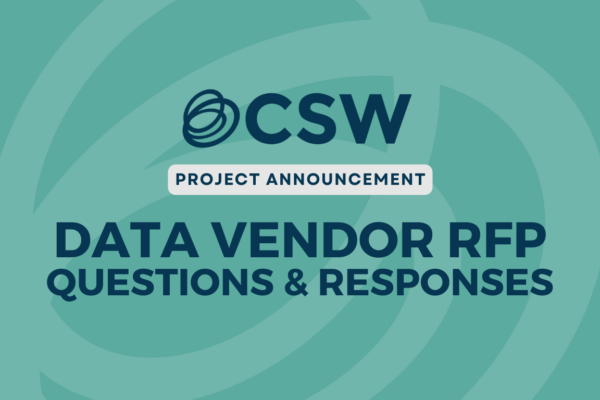
Data Vendor RFP: Questions and Responses
Meet the Research & Evaluation Team:
Megan Elyse Williams
Director of Research & Evaluation
Rachel Whilby
Research Associate
Chris Webb
Research Associate


